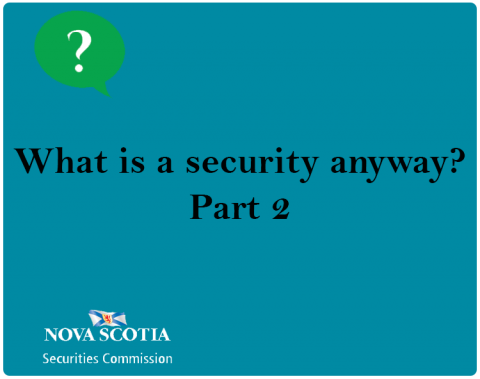Submitted by nsscadmin on

Welcome to Part 2 of our blog series on what is a security. In this we’re going through the definition of a security as written in the Nova Scotia Securities Act and explain it in clearer more understandable language. Last week in Part 1 we looked at the first six of the 18 things from the Act that are considered to be a security. Today we continue with the next five.
(vii) any agreement providing that money received will be repaid or treated as a subscription to shares, stock, units or interests at the option of the recipient or of any person or company,
This definition catches another way in which shares or other interests could be issued to a person, even if it isn’t structured as a straightforward sale.
(viii) any certificate of share or interest in a trust, estate or association,
It’s not only corporations that can issue securities. An interest in one of these other types of entities may also be a security.
(ix) any profit-sharing agreement or certificate,
Just because something is not called a security, or doesn’t take the form of a share of a corporation, doesn’t mean it isn’t a security. This could include an agreement between two individuals where one individual provides money to start a business and the other individual operates the business with the intention that they will both share the profits.
(x) any certificate of interest in an oil, natural gas or mining lease, claim or royalty voting trust certificate,
Selling interests in the production of an asset is a common form of financing in the resource sector.
(xi) any oil or natural gas royalties or leases or fractional or other interest therein
Our series concludes next week with Part 3.
